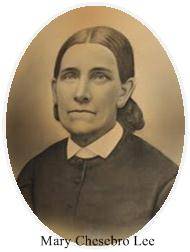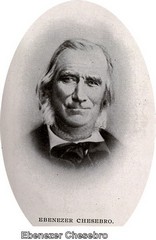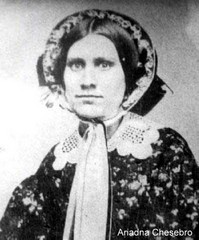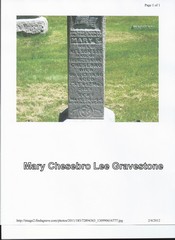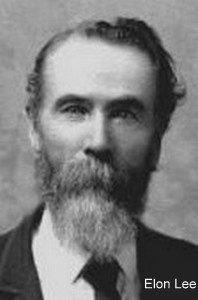Anyone reading the obituary of Mary Chesebro Lee that appeared in the October 15, 1890 issue of the Delavan Enterprise would not be impressed. Said the obituary in its entirety, with no additional mention in ensuing editions:
"Died in Delavan on Monday AM, Oct. 12, 1890. Mrs. Nelson Lee, aged 75 years. The funeral was held Monday afternoon."
What the ultra brief obituary failed to mention was that the deceased had played a prominent role in establishing the Wisconsin School for the Deaf and during the Civil War spent nearly three years as a humanitarian and Angel of Mercy in southern combat zones. So, 96 years following her death, the following more appropriate obituary is respectfully submitted.
Mary Chesebro was born in Berne, Albany County, New York, July 22, 1815, the daughter of Ebenezer and Anna Griswold Chesebro. During her youth she assisted on the family farm, received a common education in a district school and was strongly attached to a younger sister, Ariadna, who was deaf.
In 1837 she married Nelson Lee in Clarkson, New York. Operating farms in Cattaraugus and Niagara, she labored as hard as her husband in making the ventures successful. During this period, she made arrangements to have her sister enrolled at a special school for the deaf in New York City. It was unusual during that period for wives to assume a family leadership role, but Mary Chesebro Lee was an exception. Even after giving birth to two sons, Elon and George, she continued to work with her husband in the fields as well as handling the family finances, performing the usual household chores and assisting her parents and sister whenever possible. Many years later when her son, Elon, attained adulthood and was appointed superintendent of the Walworth County School System, he paid tribute to his parents with the following statement: "If I was as truthful and honest as my father and had the courage, grit, and leadership qualities of my mother, I would be satisfield with my life". Their other son, George, who was a life-long farmer in the Sugar Creek area, shared his brother's views on his parents.
In 1847, a year before Wisconsin attained statehood, a decision was made to sell the family farm in New York and come west. First purchasing land in Darien Township, two miles west of Delavan, a year later in 1848 they operated a farm in Sugar Creek Township. In 1850, Mary's parents and sister moved west and settled on the Darien Township site, about two miles west of Delavan on Highway 11. Although most historical accounts of the Wisconsin School for the Deaf make mention of Ebenezer Chesebro's role in establishing the institution, few have given due credit to his daughter, Mary Chesebro Lee, who carried out a strong effort during 1851-1852 to have the deaf school located here. After her parents arrived in 1850, Mary was concerned with the sister's education and contacted Wealthy Hawes, who previously had taught at the New York School for the Deaf and was then living in Magnolia, west of Janesville, Wisconsin. Arrangements were made for her to live in the Chesebro home and tutor Ariadna. Another local deaf child, James A. Dudley, was also tutored at the Chesebro home. Mary and her husband paid part of Miss Hawe's salary which launched the beginning of deaf education in Wisconsin. After four months, Miss Hawes returned to Magnolia and John A. Mills, another former New York deaf educator was procured to continue the classes. By this time eight students attended the sessions in the Chesebro home. Unfortunately, the classes terminated when the Chesebro, Lee and other involved local families could no longer afford the tutoring fee. Mary Lee and her father then circulated a petition throughout the county requesting state aid in establishing a deaf school. The state assemblyman from this area, Stephen S. Barlow of Delavan, presented the petition the the 1852 session of legislature and, as a result, on April 19, 1852 a bill was passed and signed by Governor Leonard Farwell, creating the Wisconsin Institute for the Deaf and Dumb. Franklin K. Phoenix then donated 12 acres of land and Delavan was selected as the site for the new school. Mary took a keen interest in the affairs of the school during its embryonic years.
With the future of Wisconsin deaf education assured, another eventful chapter in Mary Chesebro Lee's life took place following the outbreak of the Civil War. Her son, Elon, had enlisted as a private in the 10th Wisconsin Infantry, one of the first state units to be called to service in 1861. When the Walworth County Soldier's Aid Society was organized in Elkhorn, Mary Chesebro Lee became an active member. The women of the society sent boxes of knitted goods, food, and other supplies to the sick and wounded in the south. It was soon learned that many of the boxes were not being delivered to the intended recipients but were finding their way to the tents and tables of the officers. The society women were infuriated and Mary Lee volunteered to take personal charge of future distribution of mercy parcels; accompanying the shipments to Union army supply depots and field hospitals, making sure the patients received them. During her initial trip she encountered her son who had been hospitalized at Elizabethtown, Kentucky. She remained at the hospital and nursed him and other Union soldiers. After his recovery she vowed to remain in the south and offer assistance wherever needed. Outside of two trips back to Walworth County to plead for more relief supplies, she spent most of the next three years in or near southern combat Commission and hospital units as a nurse performing versatile tasks from assisting at surgical stations, distributing parcels to the sick and wounded and alleviating suffering wherever it was encountered. A Sanitary Commission communiqué once stated: "No woman in the middle west worked harder or donated more time during the Civil War than Mrs. Lee and she was known and loved by the thousands of grateful soldiers."
During her war time service, she met Mrs. Johnathan Christopher of Louisville, Kentucky, her counterpart with the Confederate army. Although on opposite sides, they were both dedicated humanitarians and had a high mutual respect for each other. During one visit, Mary Chesebro Lee presented Mrs. Christopher with 24 bottles of blackberry brandy for medicinal use in Confederate hospitals. Another time after receiving a shipment of sugar and dried currants from the Walworth County Aid Society, she made 50 gallons of jelly which she distributed to wounded soldiers.
Not only did she serve without compensation during the Civil War but she paid her own traveling expenses. During the war years she had several bouts with food poisoning, dysentery, and other discomforts associated with battle areas but never complained and cheerfully went about her compassionate errands. Said Civil War historian, Maude G. Totten, in a 1963 article: "Mary Chesebro Lee of Delavan performed her humanitarian work throughout the entire war and many Union soldiers owed their lives to her care. No woman in this nation gave more to the war effort than Mary Chesebro Lee."
With the termination of the war in 1865, she returned home and resumed farm life, never seeking any laurels for her years of valiant service during hostilities. In 1867, the Sugar Creek farm was turned over to son, George, and 97 acres purchased in Section 9, about a mile and half east of Delavan on Highway 11. She remained on the farm until her death. "Died in Delavan on Monday AM, October 12, 1890, Mrs. Nelson Lee, aged 75 years. The funeral was held Monday afternoon."
